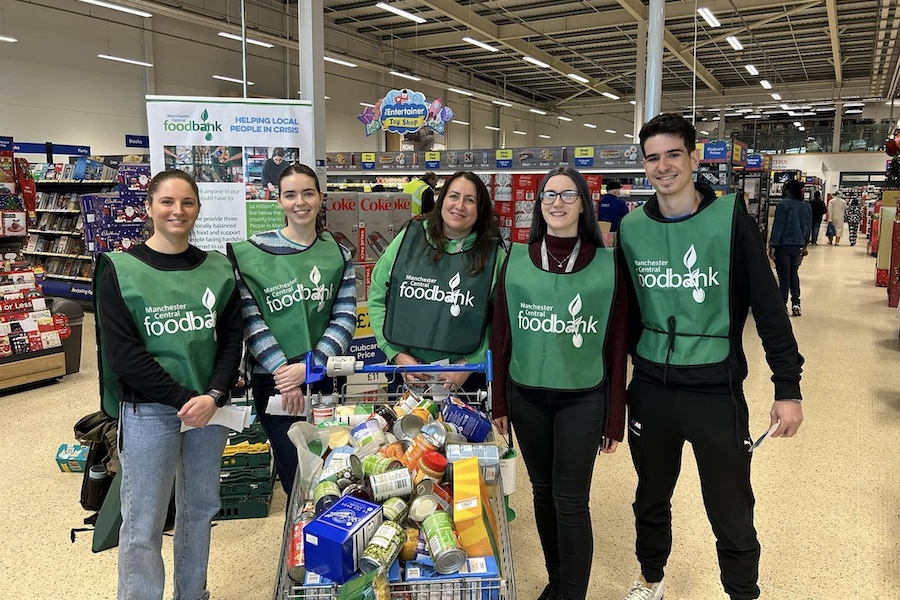Manchester is experiencing a silent food poverty crisis.
Hunger is not always visible. In Greater Manchester, tucked behind closed doors, children are arriving at school without breakfast, parents quietly skipping meals so their kids can eat, and older people going to bed early to avoid the ache of an empty stomach.
Food poverty is one of the city’s deepest crises
Food poverty has become one of the city’s deepest crises.
According to the Trussell Trust, more than 14 million people across the UK faced hunger last year, a sharp rise from 11.6 million in 2022. In the North West, more than a third of children now live in poverty and in Manchester itself, the figure is even starker: nearly 44% of children grow up without reliable access to food.
In parts of the city, like Rusholme, that number passes 50%. Food poverty on this scale is unacceptable in any modern city.
“It’s keeping parents awake at night,” said Helen Barnard of the Trussell Trust. “We’ve created a generation of children who have never known life without food banks. That must change.”
On paper, the government promises an “ambitious strategy” to address the crisis, but in practice, it is grassroots charities, overstretched councils, and ordinary residents who are left to pick up the pieces. They are the ones who warn that hunger in Greater Manchester has become a silent epidemic embedded in daily life.
Humans MCR
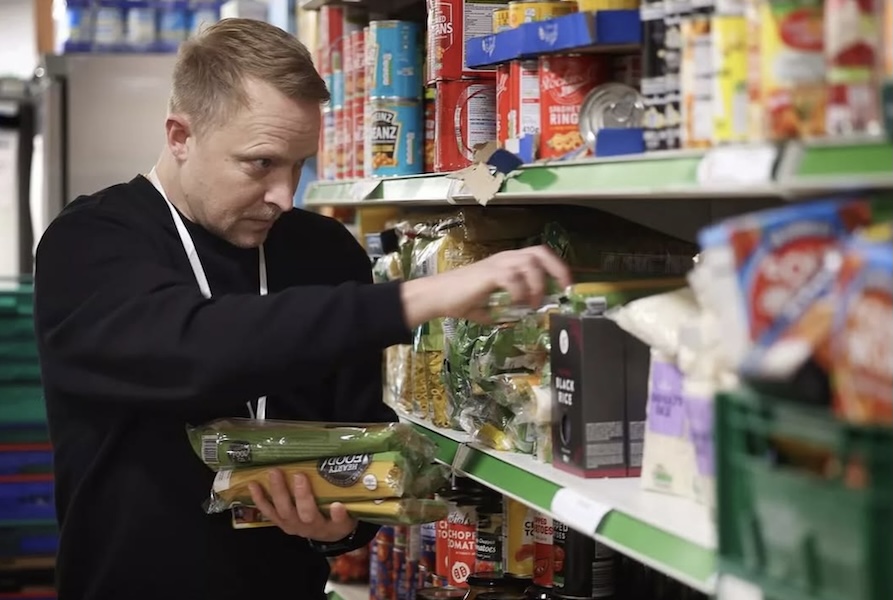 Lewey Hellewell, Humans MCR
Lewey Hellewell, Humans MCR
For Lewey Hellewell, of Manchester-based food charity Humans MCR, hunger is not an accident. It is the outcome of political decisions made over decades.
“This hasn’t happened by chance. Successive governments have created and sustained a socio-economic environment”
“The biggest drivers are the cost of living crisis, low wages that simply don’t stretch far enough, insecure work, and the two-child benefit cap,” he explained. Many have debt repayments swallowing up any remaining income. For many, food is the only part of the budget they can cut, which pushes them our way.”
This is not a temporary crisis
Lewey rejects the belief that food poverty is a temporary crisis which has been caused by sudden inflation spikes. “This hasn’t happened by chance. Successive governments have created and sustained a socio-economic environment where wages lag behind inflation, social security fails to meet basic living costs, and housing policy drives rent sky-high. Food insecurity is the outcome of political choices made over decades.”
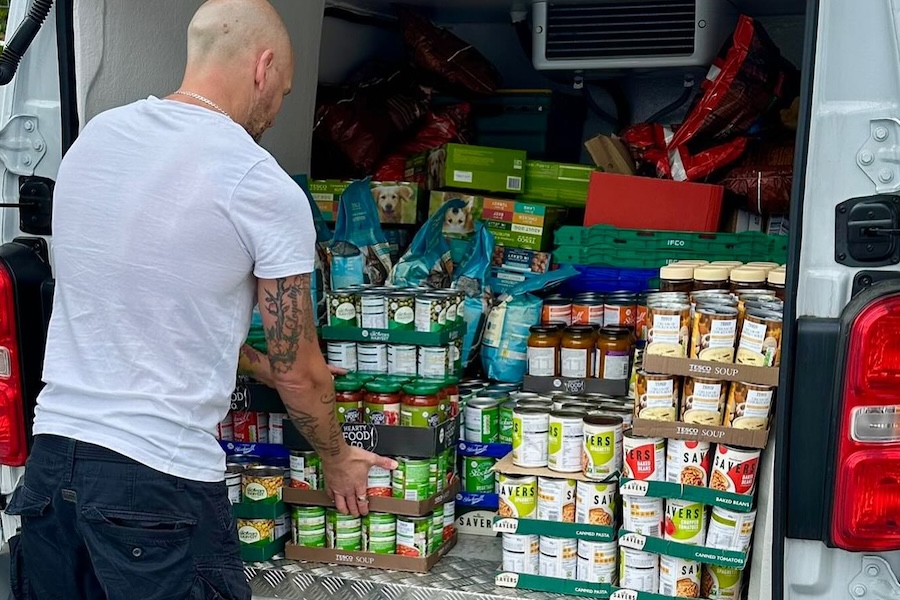 Delivering the goods with Humans MCR
Delivering the goods with Humans MCR
Humans MCR has seen a sharp rise in working families and older people seeking help. “These are people that never imagined they’d need to ask for food support,” he said. “There’s been an increase in older clients whose fixed pensions don’t cover rising costs for essentials. Food insecurity is no longer something that sits on the margins; it has seeped into the foundations of our communities.”
Demand, he said, never really drops. Summer brings steady need; winter brings a surge. “We are gearing up for a bitter Autumn and Winter. Maintaining dignity, agency, choice and control for our clients is always one of our biggest challenges. Funding is another, multi-year funding is almost unheard of, so we’re always surviving on the edge despite our growth.”
But food handouts, he argued, will never solve the problem. “Food is urgent, but it’s rarely the root cause. What makes the biggest difference is wraparound support: debt advice, benefits help, community grocers, and education. Without tackling the structural drivers, food banks will never stop being busy.
“If we could change one thing, it would be to move from emergency handouts to a rights-based approach that guarantees households the financial security to buy their own food with dignity.”
You can find out more about HumansMCR on their website here
The choice between heating and eating
In nearby Salford, the story is the same. At Loaves and Fishes, a long-established charity, the CEO describes a steady escalation in need since the pandemic.
“Since COVID and the 20% reduction in wages pushed many working people into debt, and they’ve struggled to get out of it,” they said.“Then the cost-of-living crisis began, and all of our community members are affected in some way, with many still choosing between heating and eating. The last 12 months have been particularly hard after the cost-of-living payments were scrapped in March 2024. Labour didn’t reintroduce them, and all costs are higher now than last year.”
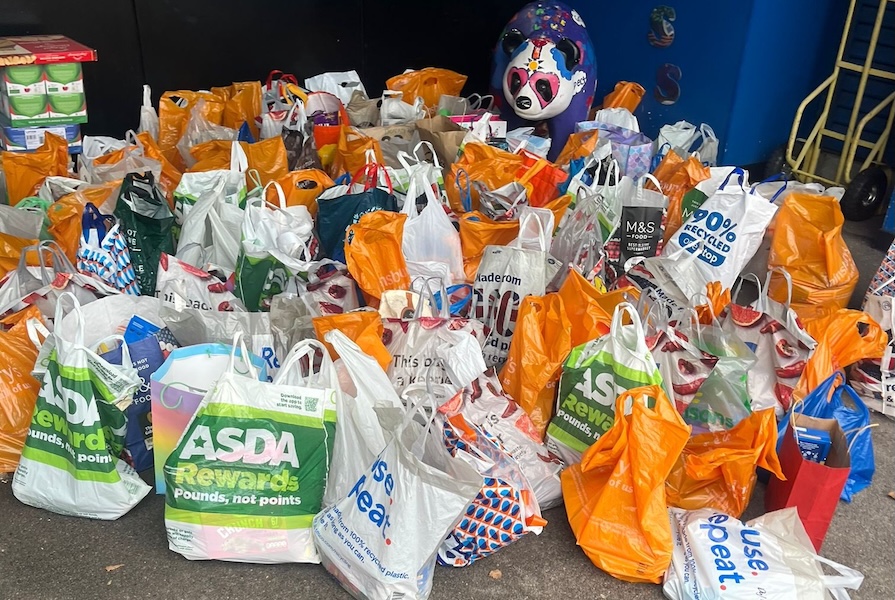 Salford Loaves and Fishes Harvest donations
Salford Loaves and Fishes Harvest donations
Private rent rises are one of the cruellest drivers. “People are paying around £600 a month more than they were two years ago. Combine that with energy bills and higher food prices, and you’re looking at families being pushed over the edge.”
Like Humans MCR, Loaves and Fishes has loads of things they help with. “We have a one-front door policy,” the CEO said. “Local statutory organisations and third sector partners work from our centre each week, so we can holistically meet a person’s needs. If we sent someone to four different organisations, they’d get stuck in a cycle of barriers. Helping people overcome those barriers is how we move them forward.”
Food banks are being stretched
But the pressures on the sector are immense. “Many food banks and charities are closing due to a lack of funding and increased demand. We have no way of being self-sustainable. Investing more in third sector organisations would make the biggest difference. We are best placed to support our communities and get the best results.”
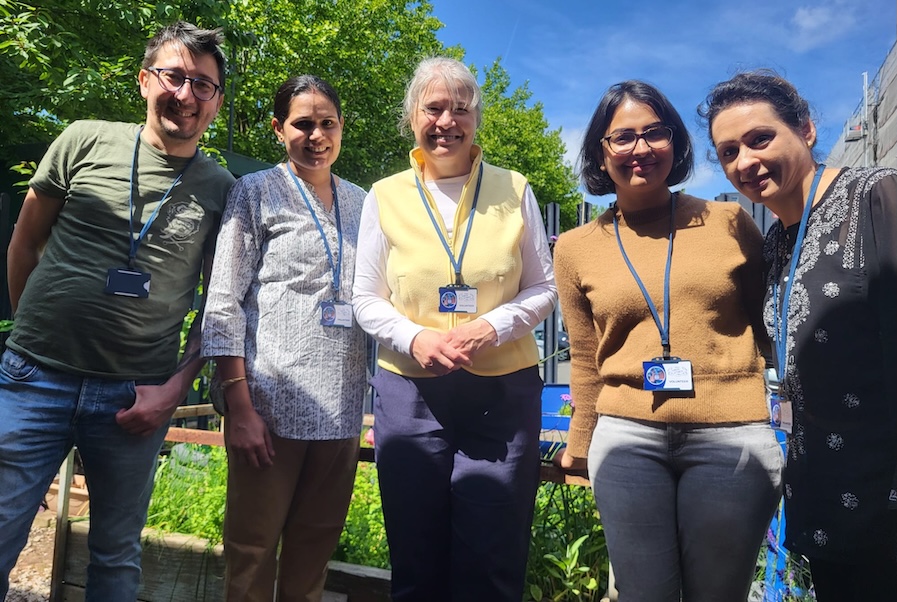 Volunteers at Salford Loaves and Fishes
Volunteers at Salford Loaves and Fishes
Asked what single change would most reduce food poverty, the answer is immediate: “Private rent caps. Bring them in line with social housing, with limits on annual increases.
“Right now, private landlords can just put rents up by £300 a month with no consequences. That is driving hunger in our communities.”
You can find out more about Salford Loaves and Fishes here
Salford Foodbank
When Paul Harris, CEO of Salford Foodbank, talks about food poverty in Salford, he doesn’t reach first for statistics. Instead, he thinks about the families he sees every week at the food bank he runs. Parents who arrive apologetic, children tugging at their hands, people who never imagined they would be in this position.
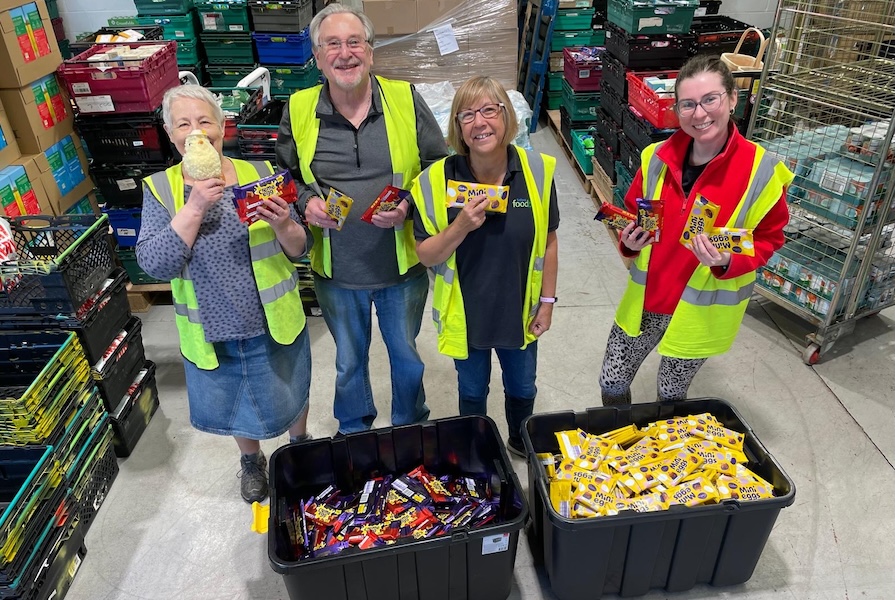 Salford Foodbank volunteers
Salford Foodbank volunteers
“The need for food banks is massively higher than it was five years ago,” he admitted, shaking his head at the thought of how quickly the situation has escalated. “It has steadied off this year, but it’s still way too high.”
For Paul, the turning point came during the pandemic. The COVID-19 crisis pushed people who were just managing into sudden hardship. Work dried up, hours were cut, wages shrank, and debts grew. “That was where the decline really started,” he explained. “The cost-of-living crisis then followed, and we saw a huge uptick in users at Salford Food Bank. It hasn’t stopped since.”
“Unfortunately, children are making up a large proportion of the numbers”
What worries him most is that children make up a significant share of those who collect food parcels.
Behind every statistic is a young life shaped by hunger, and Harris is painfully aware of what that means for their futures. “Unfortunately, children are making up a large proportion of the numbers,” he said, “That’s the most heartbreaking part of it.”
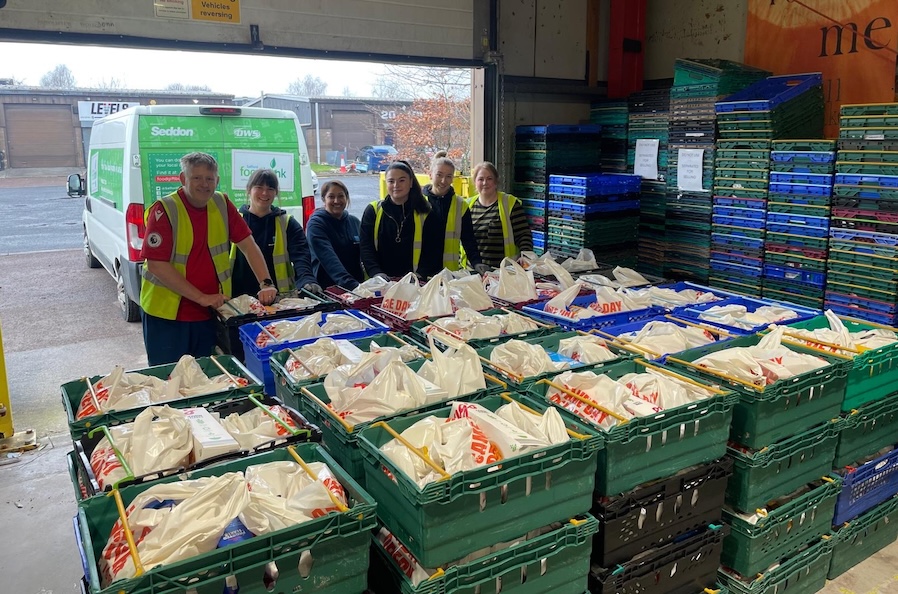 Salford Foodbank volunteers
Salford Foodbank volunteers
The challenges people face are complex
Paul is clear that there is no single cause for the demand he sees. “The challenges that people are facing are multifaceted and complex,” he explained. Some are local, like skyrocketing energy bills that left families with no choice but to seek help. Others are national in scale, such as rising debt and low wages.
“We’re seeing more and more people go into debt because of rising costs across the board,” he said. The consequences are not just financial but deeply personal. “It’s having a huge impact on their physical or mental health.”
Food poverty, in his view, is not just about empty cupboards but about the constant stress and anxiety that eats away at people. Parents skip meals to make sure their children are fed. Older residents go without heating to keep a roof over their heads. “It’s survival mode, day after day,” Harris observed.
If there is one pattern that stands out to him, it is that demand never truly falls. Peaks may be followed by plateaus, but the baseline keeps ratcheting upward. Each crisis adds another layer of hardship, and the people who arrive at Salford Food Bank are not the same faces each time. New families come forward every month, often ashamed, often exhausted.
“The pandemic, the energy price crisis, food inflation, it all builds on what came before,” Harris said. Even when inflation slows or wages rise slightly, the scars remain. People carry debts, unpaid bills, and arrears that drag them back into need.
A safe space with no judgment
Salford Food Bank is a place where people can come without judgment and with dignity. Volunteers greet families with warmth. Advice is offered where possible. Partnerships with other organisations mean that those in crisis can sometimes be signposted to wider support. But Paul knows the food parcels are just a sticking plaster.
“The demand is way too high, and food banks can only ever be an emergency measure,” he reflected. Like other charity leaders across Greater Manchester, he argues that food insecurity can only be tackled by addressing the structural issues that force people into poverty: unaffordable rents, insecure work, and social security payments that don’t cover essentials.
For Paul, what lingers most is not the numbers but the stories. A single mother who works full-time but still cannot stretch her wages far enough to feed her children. A pensioner whose energy bill doubled overnight. Parents who confide that their children go to bed hungry because they simply cannot afford enough food.
These are not isolated cases, but part of a pattern that has become embedded in the city’s life. “The need for food banks has never really gone away,” he said. “And that should be a wake-up call for all of us.”
Paul does not claim to have all the answers, but he is clear about what needs to change. Food banks cannot and should not become a permanent fixture in society. “Emergency food should not be the norm,” he insists. “What people need is financial security, fair wages, affordable housing, and a benefits system that prevents families from sliding into destitution.”
You can find out more about Salford Foodbank’s work here.
Feed My City
For Olivia Gilbert, who works at Feed My City, the rise in food poverty in Greater Manchester is not abstract; it is measured in the number of schoolchildren who would otherwise go to bed hungry.
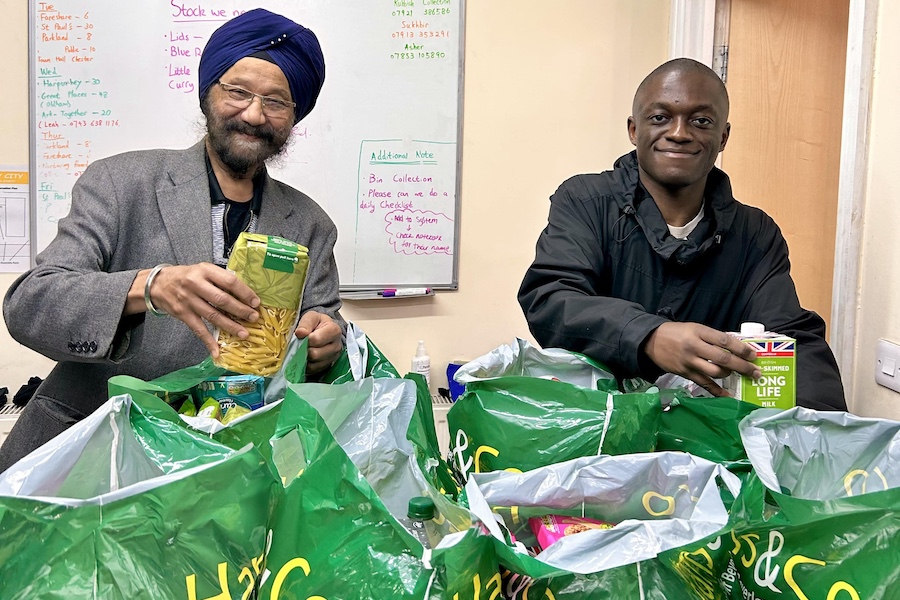 Volunteers at Feed My City
Volunteers at Feed My City
“We’ve certainly seen an increase in demand for families, as opposed to individuals,” she explained. One of the starkest indicators is the charity’s work with four local schools, where they provide hot meals to ensure children whose families are struggling don’t go without dinner. “These schools have their own community pantries and staff dedicated to supporting families in poverty. Without that, many of the children we feed simply wouldn’t receive an evening meal.”
Olivia is clear that families rarely come to Feed My City because of a single crisis. Instead, they are weighed down by overlapping challenges that feed into each other. Low wages, insecure work, rising rents and bills, debt, and a complex benefits system all converge to create a vicious cycle.
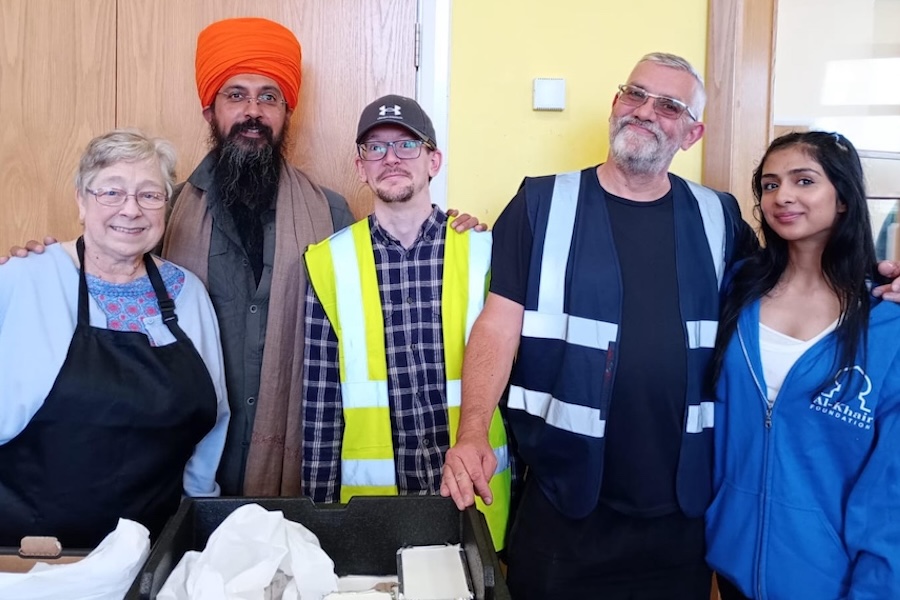 The Feed My City team
The Feed My City team
“Everybody is feeling the pinch at the moment”
“Everybody is feeling the pinch at the moment, and low wages and insecure work are huge factors,” she said. “People can be in employment and still need food support because their income doesn’t stretch to cover rent, bills and transport. Add feeding a family into the mix, and it can be really tough to stay afloat.”
Even those who turn to the benefits system find it riddled with obstacles. Paperwork delays, sanctions that cut people off without warning, and confusion about entitlements can plunge a family into crisis overnight. “It is very rarely one singular issue that pushes a person into crisis,” Olivia reflected. “As challenges begin to exacerbate each other, it becomes harder to climb out. And as you can imagine, all of these issues mounting up can really impact a person’s mental health, which in turn makes it even harder for people to reach for support.”
Generational poverty
Generational poverty is something Olivia encounters often. “Something we do see is several generations of the same family coming to us for support,” she said. In her view, this pattern reflects deep-rooted systemic issues. “If a person’s parents couldn’t access support or didn’t know how, then it’s likely their children end up in the same boat. We need to break the cycle.”
Feed My City has had to rethink how it operates in order to meet the changing needs of families and older people. Flexibility, Olivia argued, is the key. “Feed My City is one of the few emergency food support charities in Greater Manchester that operates seven days a week, virtually 365 days a year,” she explained.
“Being open during the weekend means working families can collect food from us without needing to take time off work. And just being accessible every day of the week minimises the anxiety people feel when trying to figure out where their next meal is coming from.”
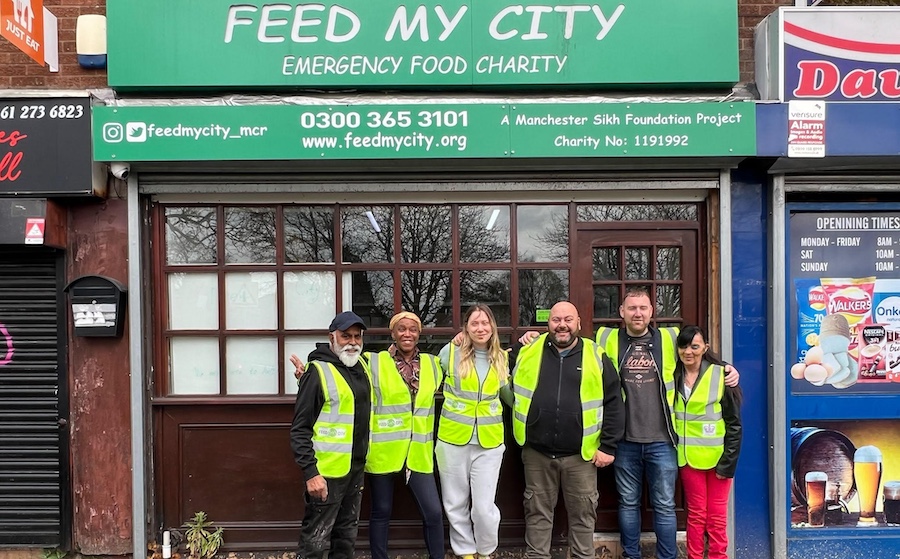 Feed My City
Feed My City
Collaboration is vital
But beyond opening hours, Feed My City believes collaboration is vital. Too often, charities operate in silos, leaving gaps that vulnerable families can fall through. “Being connected with other organisations and knowing I can point people towards them, and knowing they’ll send people our way, would go a long way in preventing people from falling through the cracks,” she said. Building stronger networks of support is, in her view, one of the most urgent challenges the sector faces.
While emergency meals are crucial, Olivia insisted that food banks alone cannot solve poverty. What matters most is ensuring that people can access wider services, without facing the exhausting maze of phone calls, travel costs, and waiting lists that currently block so many.
“The importance of local provisions cannot be overstated,” she said. “If people were able to access face-to-face support in their local communities for whatever challenges they’re facing, it would relieve so much pressure. Right now, too many people are put off even trying because it feels intimidating or impossible.”
Debt advice, benefits help, education, and community grocers all play a role in stabilising families, she argued. Food support can only ever be the entry point.
Combined authorities have a crucial role to play
Olivia is convinced that schools, councils, and the Greater Manchester Combined Authority all have crucial roles to play in moving from crisis response to crisis prevention.
“Local councils can ensure support systems are properly coordinated and funded, while schools are often the first to notice when a family is struggling,” she explained. But to be effective, schools need more resources: additional pastoral staff, welfare officers, and connections to local support networks. “Affordable housing, transport, and liveable wages are much wider issues that must be tackled strategically by the GMCA,” she added. “No single council or charity can solve food poverty. But if we work together to protect people from other forms of hardship, fewer people will fall into it.”
When asked what single change would make the biggest difference in reducing the demand for emergency food support, Olivia did not hesitate. “Income security is king,” she said firmly. Whether earned through decent wages or guaranteed through reliable safety nets, a stable income is, in her view, the foundation on which everything else depends. Without it, small crises quickly snowball into lifelong struggles.
Feed My City will continue to serve hot meals, support schools, and keep its doors open every single day. But as Gilbert points out, food banks were never meant to be permanent. “We’re here for as long as people need us,” she said. “But the real goal should be ensuring fewer and fewer families ever need to knock on our door.”
You can find out more about Feed My City’s work here
Manchester Central Foodbank
“Child poverty is the most visible symptom of a broken system”
At Manchester Central Foodbank, the statistics are stark: around 40% of the people who walk through its doors are children and young people. For Ben, who helps run the service, this is the most sobering fact of all.
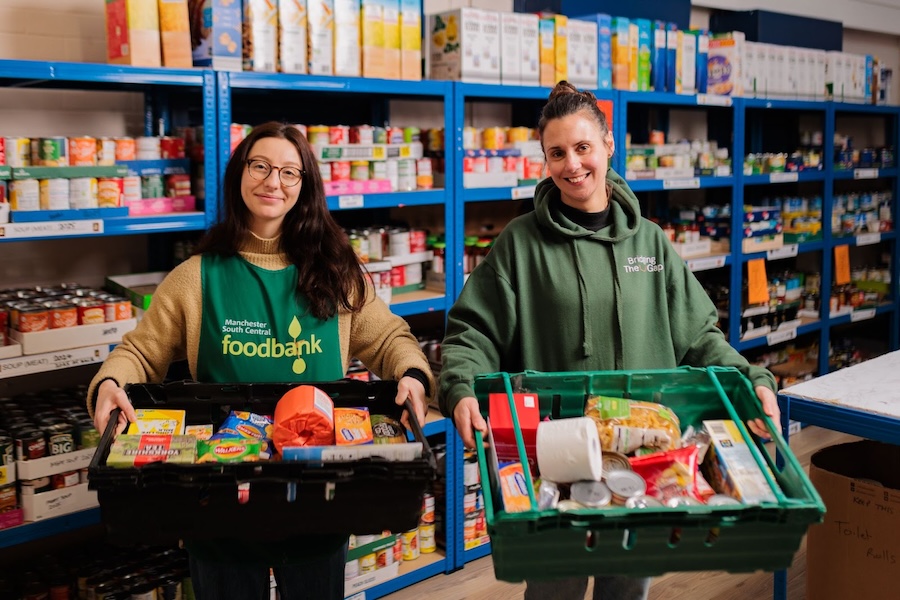 Manchester Central Foodbank volunteers
Manchester Central Foodbank volunteers
“It can be shocking to realise how many children and young people are affected,” he explained. Families are referred through schools, housing officers, charities, and local organisations who know their struggles first-hand. Teachers, in particular, have become a critical link in identifying when children are going hungry. “We work closely with schools, who often refer families they know are struggling,” Ben said. The result is clear: childhood hunger is not an isolated problem, but a daily reality across Manchester.
Hidden epidemic
He called it a “hidden epidemic,” one that briefly surfaced in the national spotlight during Marcus Rashford’s campaign for free school meals but has since slipped down the political agenda. “At the start of the pandemic, there was a lot more discussion,” he reflected, “but the news cycle moves on.”
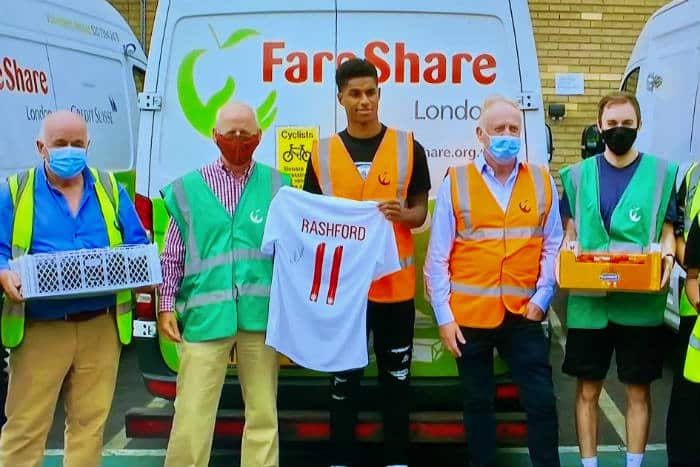 Marcus Rashford working with Fareshare
Marcus Rashford working with Fareshare
One of the most damaging policies for families, Ben argued, is the two-child benefit cap, introduced in 2017. “In simple terms, you can only claim the child element of Universal Credit for two children. Any children beyond that aren’t covered,” he explained. While Child Benefit still applies to all children, the amount is far smaller and nowhere near enough to make up the shortfall.
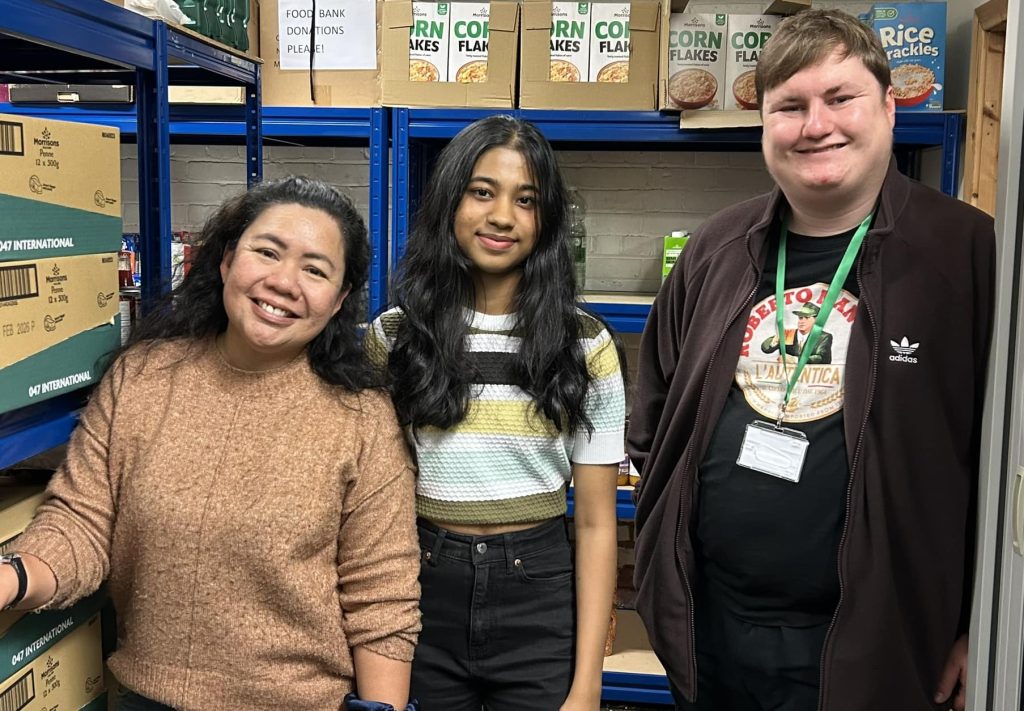 Ben (R) with volunteers from Manchester University
Ben (R) with volunteers from Manchester University
The policy has left many families struggling to provide for their children, especially in the critical early years. “It’s had a huge impact on families for the last eight years,” Ben said firmly. “Any change would be welcome, but in my view, it should be scrapped completely. That would have a profound impact.”
Demand has grown relentlessly
Manchester Central Foodbank, part of the Trussell Trust network, has been running since 2013. Over the past twelve years, demand has grown relentlessly, with the last two years being their busiest ever. “At the moment, we’re supporting about fifteen to fifteen-and-a-half thousand people a year,” Ben said.
The causes are painfully familiar: rising rents, soaring gas and electricity prices, food inflation, and stagnant wages. “Social security levels haven’t risen anywhere near in line with inflation,” he explained. “Everyone feels that food prices are high, but if you’re already living on a much lower, fixed income, you feel it even more.”
As time goes on, families don’t just struggle; they spiral. To pay for essentials, many turn to borrowing from friends, family, or high-interest lenders, adding yet another burden. “The longer this crisis goes on, the worse it gets for a lot of people,” Ben said.
While the food bank supports people from all walks of life, single households, large families, those in work, those on benefits, and those entitled to neither, the problems they face are rarely straightforward. Health, housing, and poverty feed into each other.
A real mix of circumstances
“We also see problems where people can’t work, or can’t work as much as they’d like, because of health conditions,” Ben explained. Poverty itself makes people ill, and ill health then makes it harder to earn. “If you can’t afford to eat nutritiously, you might be surviving on less healthy food. If your housing is poor and you can’t afford to move, your health suffers too. It’s a real mix of circumstances.”
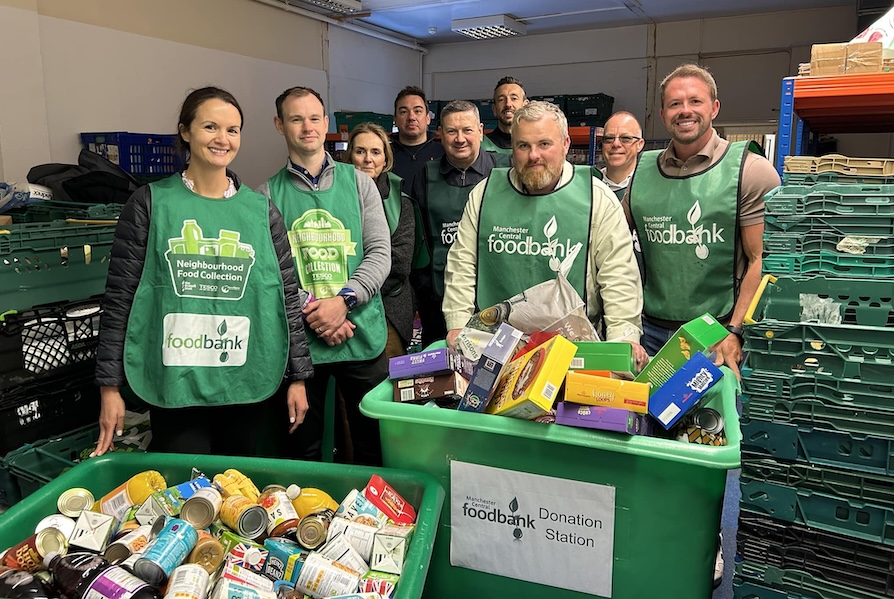 Volunteers at Central Manchester Foodbank
Volunteers at Central Manchester Foodbank
For Ben, food parcels are only part of the story. Manchester Central Foodbank has built strong partnerships to offer a wider range of support. Through the Trussell Trust’s financial inclusion project, Citizens Advice workers attend every session, helping people face-to-face with debt, benefits, and money management. “The results are fantastic in terms of money secured and debt managed,” Ben said.
The food bank also works with other partners to provide digital inclusion support, recognising that smartphones and data are now essential tools for life. “People have to use them for things like updating their Universal Credit journals,” Ben explained. Through a partnership with the Good Things Foundation, they distribute SIM cards, data vouchers, and sometimes devices. Energy support is also offered, providing some relief during the toughest winter months.
Perhaps most importantly, the food bank makes referrals to specialist services across housing, employment, and health. “A lot of people coming to us are in complex situations that we’re not best placed to resolve,” Ben admitted. “So we’re building signposting into our sessions, giving people the tools to access the help that’s out there. Because when things go wrong, people can feel like they’ve nowhere to turn.”
Food poverty lies not in charity but policy
Ultimately, though, Ben believes the solution to food poverty lies not in charity but in policy. “Ideally, of course, we wouldn’t exist,” he said. “In an ideal world, the social security net would be strong enough that people wouldn’t need food banks at all.”
That conviction is why Manchester Central Foodbank has joined the Trussell Trust’s Guarantee Our Essentials campaign, which demands that Universal Credit be raised to cover the true cost of basic living. The campaign calls for the rate, currently just £92 a week, to be independently set, and for deductions never to push households below the essentials threshold.
This summer, Ben and his colleagues took that message to Westminster, joining other food banks to lobby MPs face-to-face. “We met in Westminster Hall, it was a great experience, though it happened to be the hottest day of the year and we queued for over an hour to get in,” he recalled with a smile. But the purpose was serious: to push for reforms that would ensure no family in Manchester, or anywhere else, has to depend on emergency food to survive.
For Ben, the message is simple but urgent. Child poverty is the most visible symptom of a broken system, and unless reforms are made, another generation will grow up never knowing a Manchester without food banks.
“We’re here for now,” he said, “but in the long term, food banks shouldn’t have to exist. Every family should be able to afford the essentials. That’s not too much to ask.”
You can find out more about Manchester Central Foodbank by clicking here
For Nic Ward, Community Department Lead at Manchester Settlement, the scale of change in recent years is impossible to ignore. “We know from the statistics that things have changed massively,” she said. “On the ground, we can clearly see that more people are accessing our food pantry, but also, across all our family work, our stay-and-play sessions and our cost-of-living projects, many more people are using the services we provide.”
The increase is visible in every corner of their work, from nappies and wipes distributed through partner charity Visit from the Stork, to families being referred daily to their food pantry. Even the organisation’s playgroups, once filled with parents looking for community, now serve as a refuge for those at the sharpest end of poverty. “For me, it’s a success when vulnerable families are attending, rather than just ‘yummy mummies,’” Nic explained. “I want the people who really need that space to be the ones who come along.”
A walking group for families
Sometimes, the depth of need reveals itself in unexpected ways. Nic described a walking group for parents and children that was designed to encourage healthy activity by offering small vouchers as incentives. At first, participants received £5 gift cards for places like Costa or Amazon. “It allowed families to do something many of us take for granted, like going for a coffee, which for some is completely out of reach financially,” Nic said.
But parents soon asked for supermarket vouchers instead. “They told us they really needed Morrison’s vouchers,” she recalled.
The store only offered £10 cards, so families had to attend two sessions to earn one, and they did, because they were desperate for food. For Nic, the moment was telling. A project aimed at wellbeing had become another way families tried to plug the gaps left by inadequate wages and benefits.
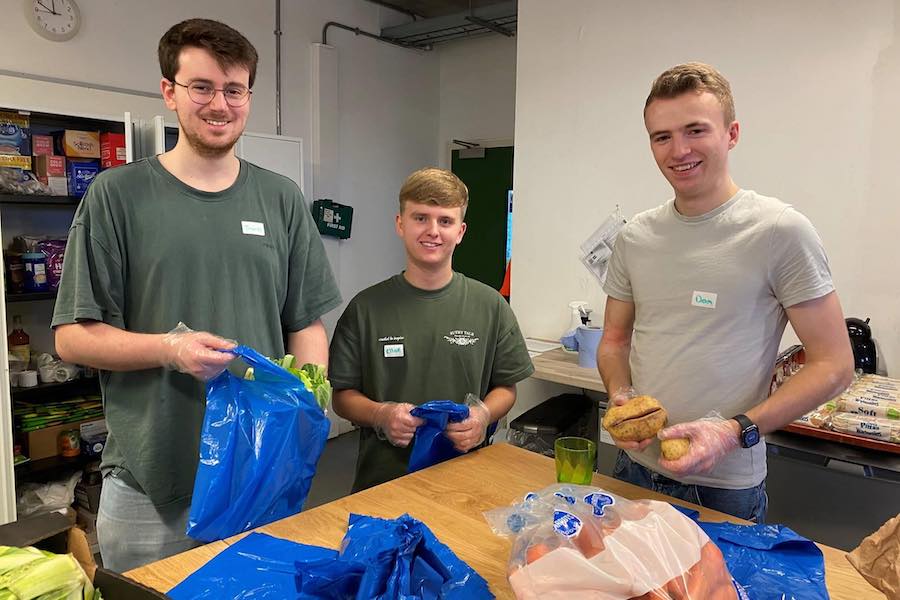 Volunteers at Manchester Settlement
Volunteers at Manchester Settlement
It’s not just about food
Food is just one part of the picture. Nic is blunt about the biggest challenge she sees: housing. Families in East Manchester are crammed into poorly maintained homes, often run by private landlords who fail to carry out repairs. “People are stuck in poor-quality homes and unable to access better housing,” she said. “The waiting lists for council or housing association homes are around seven years now.”
Alongside poor housing, families face spiralling debts, mounting bills, and complex benefits systems. At Manchester Settlement, help is holistic: debt advice through Pennysmart, in-person benefits support, and even social prescribers to assist with health and mobility needs. “Families facing financial hardship usually have multiple problems and need face-to-face help,” Nic explained. “It’s all about relationships, building trust with key professionals. Only then do families start to open up and share what’s really going on.”
Unlike many food projects, Manchester Settlement built its food pantry with working families in mind. “Coming out of the pandemic, we recognised that working people weren’t getting support, so we created something accessible to them from the start,” Nic said. Older people, meanwhile, are supported through simple, practical measures: staff help them navigate online forms or access services they would otherwise struggle to reach.
Nic believes that the difference Manchester Settlement makes is not just about food or finance, but connection. “Of course, paying the bills is the immediate priority, but humans also need connection and belonging,” she said. That’s why the charity runs specific groups for families with children who have special educational needs and disabilities (SEND). Evening sessions for parent-carers, where they can share experiences and support each other, have become lifelines. “When someone says, ‘Me too,’ that shared understanding is such a relief,” Nic said. “It’s that sense of connection that makes the biggest difference.”
The future must go beyond crisis point
For Nic, the future must go beyond crisis response. She sees promise in the community grocery model, which allows people to shop with dignity while accessing wraparound support like debt and benefits advice. “If we could properly fund that model, rather than just supporting emergency food banks, people could choose their own items with dignity and get the other help they need, too,” she argued.
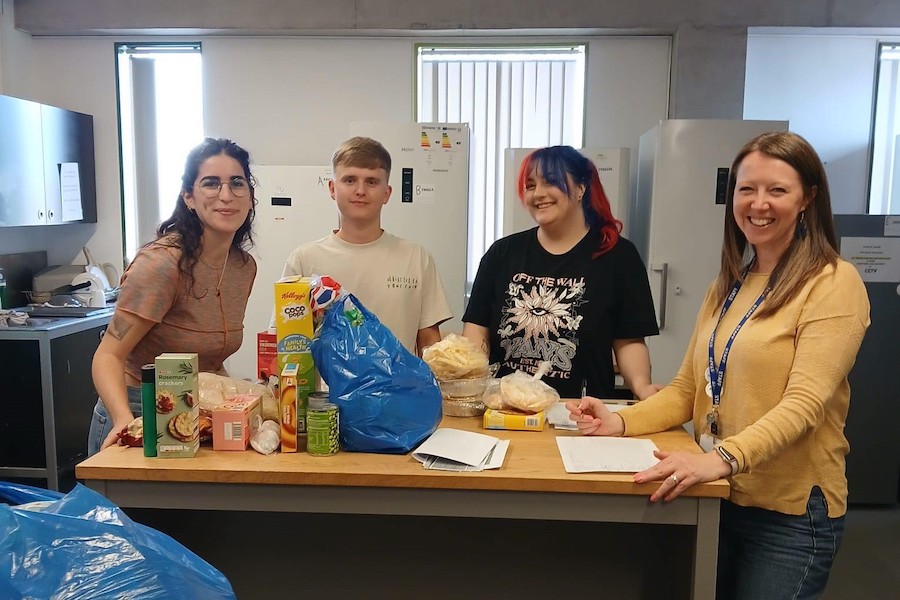 Volunteers at Manchester Settlement
Volunteers at Manchester Settlement
She also believes holiday food vouchers should be reimagined: “Parents who receive free school meal vouchers during holidays should be given vouchers for community groceries instead. It would help them spend their money more wisely and build sustainable habits.”
Stories of transformation keep Ward motivated. She recalls families arriving at Manchester Settlement in crisis, struggling with housing, debt, or school issues, and leaving with so much more. Through the pantry, stay-and-play groups, and family hub support, many rediscover community, resilience, and even joy.
“It’s about more than survival,” Nic said with conviction. “It’s about helping people rebuild their lives through support, connection, and care. That’s what gives families the best chance to move forward.”
You can find out more about Manchester Settlement by clicking here
How is the council helping tackle food poverty?
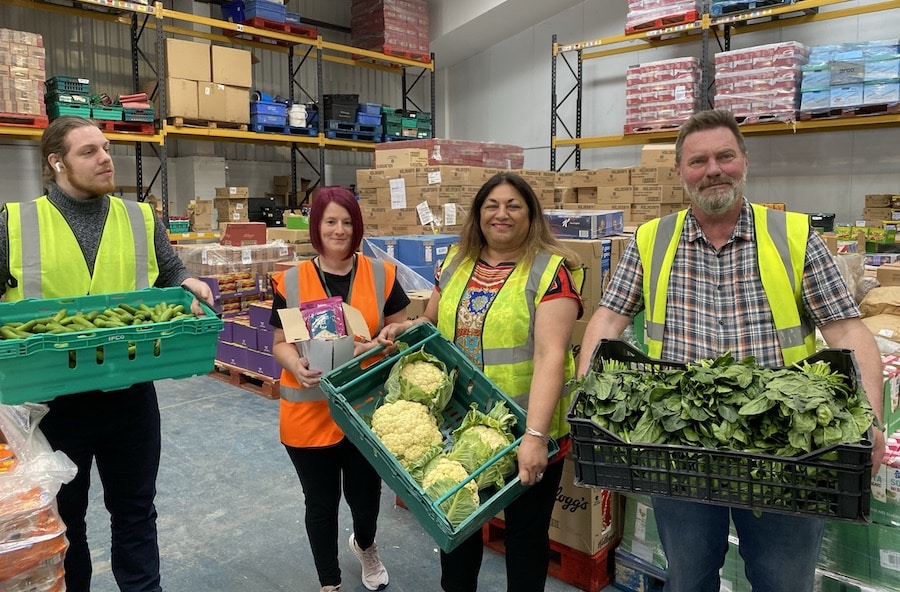 Our Manchester Food partnership
Our Manchester Food partnership
Charities are not alone in trying to tackle Manchester’s food poverty crisis. Manchester City Council has trialled innovative approaches to move beyond emergency provision. Last winter, the Our Manchester Food Partnership delivered 96 ingredient boxes to families via Early Years centres. Each box contained fresh produce and staple foods, plus recipes and advice to encourage healthy, affordable cooking.
Parents were often surprised by the impact. “My children don’t really eat vegetables,” one mother admitted, “but they got excited when they saw the big box of food. They tried vegetables they’d never tried before. I don’t usually buy a lot because they waste it.”
Councillor Joanna Midgley, the council’s Deputy Leader, says the trial went beyond food. “Deprivation and a lack of access to healthy and nutritious food can have a hugely negative impact on people’s health, especially young children. Providing recipes and practical advice on cooking is as important as the food itself.”
The trial’s success hints at future strategies: building resilience, not just filling cupboards.
“No child should go hungry”
At the city-region level, Mayor Andy Burnham has made tackling holiday hunger a central plank of his agenda. Over 120,000 pupils across Greater Manchester are eligible for free school meals, around 26% of all pupils, and many more families just above the threshold still struggle. School holidays turn that struggle into a crisis.
In 2020, the Greater Manchester Combined Authority (GMCA) launched the No Child Should Go Hungry programme, distributing over 13,000 emergency food cards during school holidays. Unlike parcels, the cards allow families to shop in supermarkets and choose their own food.
You can find out more about the No Child Should Go Hungry programme here
Burnham has also committed Greater Manchester to the national Right to Food campaign, calling for access to food to be recognised as a legal right. Plans are now underway for a Food Insecurity Action Network, a grassroots, community-led partnership to build longer-term solutions.
The cost of doing nothing
Behind the statistics of food poverty, the policy debates, and the grassroots solutions are the voices of parents like the one Lewey Hellewell described: a mother working full-time who still finds herself in his queue.
“These are people who thought food banks were for other people,” he said. “But when your wages don’t stretch, when your landlord adds £600 to your rent, when your pension doesn’t cover your bills, what else can you do? It’s about survival.”
If the silent epidemic of hunger in Manchester continues unchecked, its legacy will be felt for generations: children struggling at school, adults forced into cycles of debt and ill health, communities eroded by stress and insecurity.
The solutions to food poverty are not mysterious. Fairer wages. Rent caps. Cash-first support. Investment in community organisations. A shift from charity handouts to dignity and rights.
As one community worker put it bluntly: “We’ve created a generation of children who have never known life without food banks. That must change.”
To donate to the Trussell Trust and help put an end to food poverty, click here.
